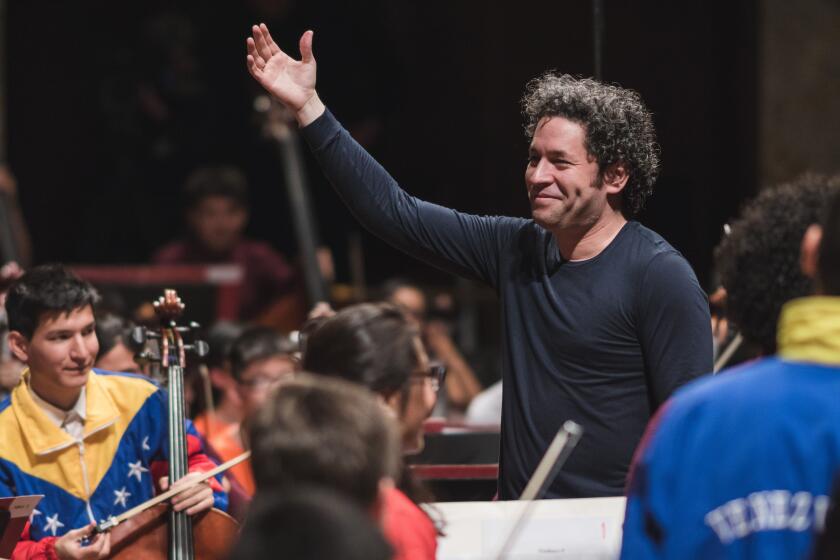Claremont Colleges Offer Rooms With Views of L.A.
- Share via
Los Angeles and its artists are being showcased at two Claremont colleges. Sharon Ryan and Sarah Seager are seen separately in the galleries of Claremont Graduate University. “L.A. Stories: Engaging the City” occupies Pomona College’s Montgomery Gallery.
The latter, a complex theme show curated by Rebecca McGrew, presents nine rather dystopian views of life in the central city. An artists collective called Public Works Administration, for instance, addresses the problem of low-income housing in East L.A. in one installation. An interactive video by Nancy Buchanan takes on the problem of real estate manipulation. The collective attitude is plainly influenced by such socio-critical urban writers as Mike Davis and Norman Klein.
Mixing documentation and aesthetics is an expressively dicey enterprise. (German Hans Haacke is one of the few to master it.) Too often large didactic installations fall into a muddle. Another collective, Collage Ensemble, shows “Lo Cal Frozen Blues: The Produce District”: A video gives an insider’s view of the subject. A surrounding environment consists of fridge, outdoor grill, garden bed and plastic crates for sitting. The ensemble represents either too much unresolved effort or too little. This hybrid form too frequently gets in its own way. Its makers need to think about basic issues of communication in a gallery setting.
Kim Abeles is something of a local veteran at L.A.-themed installations. His installation “Legend for a Mapping (L.A. Architecture)” centers around a wall-size conceptual skyline outlined in metal rod. Landmarks like City Hall, the Central Library, the Brown Derby and the old Herald-Examiner building are numbered as if keyed to a listing somewhere. I couldn’t find it.
The piece includes vintage tables covered with local architectural memorabilia including photographs of such luminaries as Frank Lloyd Wright, Aline Barnsdall and Charles and Ray Eames. A pair of sculptural molded plywood objects are probably splints the Eames mass-produced for the wounded in World War II, but there’s no label. Abeles’ work improves steadily, but something keeps him from getting to the point.
Instructive exceptions emphasize the virtue of simplicity. Don Normark’s straight-ahead 1949 photo essay “Chavez Ravine” brings poetry to a historically elegiac subject. Normark captured the present site of Dodger Stadium when it was an idyllic haven for poor Mexican Americans. Simple clapboard houses dotted the hillside’s unpaved streets. Gathering places included church, school and liquor store. Normark shows boys wrestling, a kid shining his shoes, three chaps discussing the Bible and handsome World War II vets with their pretty wives relaxing in the kitchen. Everybody looks fresh and content.
Even viewers uninformed about the political mess that ousted the ravine’s occupants can sense that something went unjustly awry. Similarly Harry Adams’ photos of the ‘60s-era African American community have an optimism we no longer see. Life in the city got fragmented and messy. In that way at least the exhibition captures our moment.
*
Over at Claremont grad school, gallery director Dean De Cocker presents two small exhibitions confirming that modernism is now a traditional style. Sharon Ryan makes Minimalism sing in nine lovely small works on birch plywood. Infused with the spirit of Asia, at first they look like virgin blocks for elaborate Japanese prints. Then we realize she’s left them all but untouched. She goes in with a calligraphy brush and one muted color to emphasize curves in the grain, teasing out shapes suggestive of everything from leaves to genitalia and monsters of the mind. The work is a triumph of delicate restraint and lyric wit.
Sarah Seager puts her twist on a ‘60s fad for air-filled plastic furniture in “Proposal for an Installation With Sarong Pants . . . “ She intends her work to satirize the art system. That’s also in the Pop-era spirit. Plastic sculpture are fashioned into rectangles kept plump, upright and slightly movemented by air blowing in from compressors. The largest is in two sections, transparent, gray and lettered with the designation “8 Pt. Black Type on Color Tint.” Reference to a very small type size printed about a foot high on an object some 25 feet long suggests a pun on scale. She asks us to pretend she’s shrunk us in proportion. The work recaptures the fun-for-its-own-sake ethos of 30 years ago. It’s updated, I think, by a piece bearing the words “*TOTAL OF PAYMENTS/$3,213.33/24 MONTH LEASE.” Get it? This art would be nothing without the current economic fear of . . . inflation.
* “L.A. Stories: Engaging the City” Pomona College, Montgomery Gallery, 330 N. College Ave.; to Oct. 11, closed Monday, (909) 621-8283; Sharon Ryan, Sarah Seager, Claremont Graduate University, Peggy Phelps and East Galleries, 251 E. 10th St., Claremont; to Friday, (909) 621-8071).
More to Read
The biggest entertainment stories
Get our big stories about Hollywood, film, television, music, arts, culture and more right in your inbox as soon as they publish.
You may occasionally receive promotional content from the Los Angeles Times.










